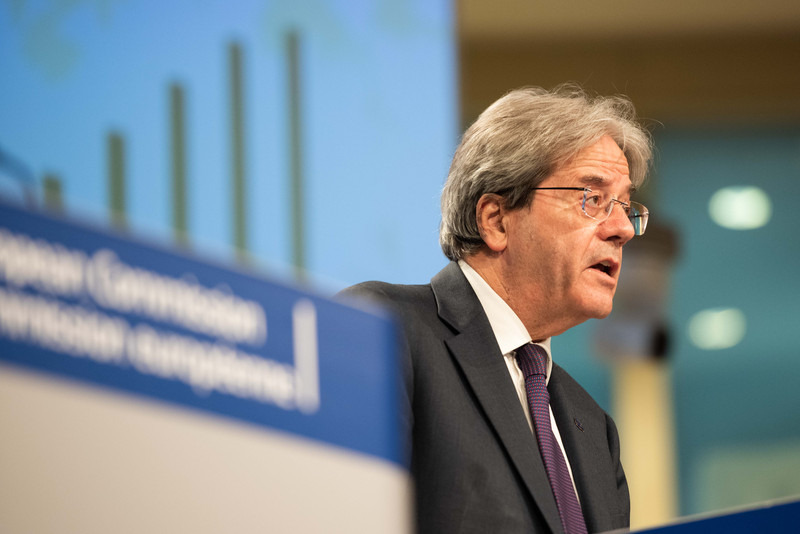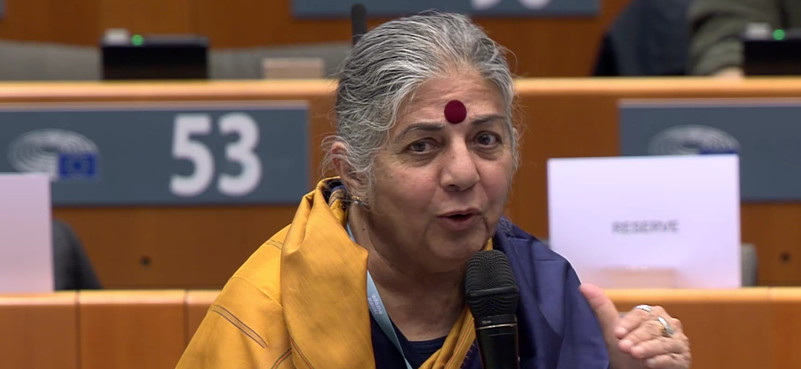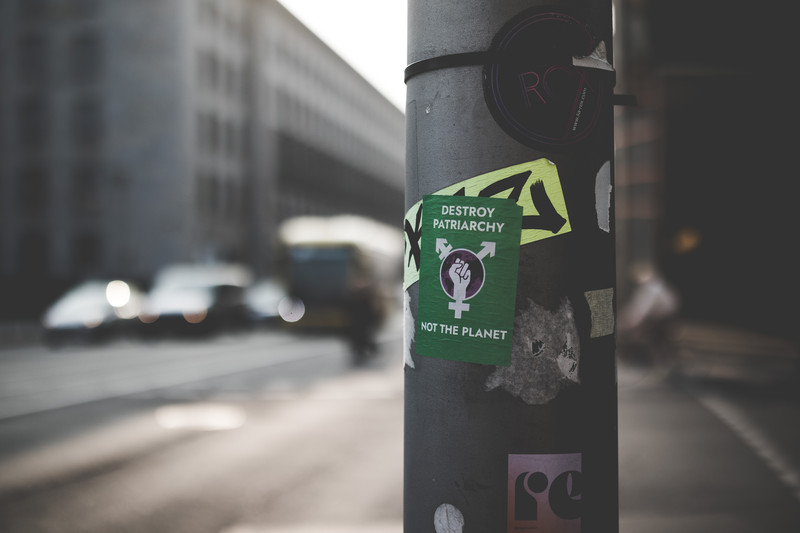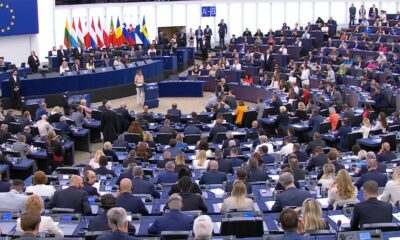Green Economy
EU: Wage Earners Will ‘bear The Brunt’ Of Inflation By 2023

The European Commission increased its economic growth projection on Monday (15 May), stating that lower energy prices, and a strong labor market would help the EU narrowly avoid a recession.
The Spring Economic Forecast 2023 has raised the growth forecast for this year to 1.0 percent, which is slightly higher than the 0.8 percent predicted in February.
-

The unit profit has increased in all euro zone countries and sectors, but in some more than others (Photo by EU Commission).
“As lower prices of energy continue to relieve households’ and firms’ budgets the economic expansion will continue in 2023, and pick up a little pace in 2024,” said Economy Commissioner Paolo Gentiloni at a press conference on Monday. He added that he was “proud” that the European economy showed such remarkable resilience.
The report states that the burden of resilience has fallen primarily on wage earners and public finances, which “have taken the brunt of the high imported inflation,” whereas “companies are generally successful in passing higher production costs on to consumers.”
Real wage loss
Gas prices have dropped to EUR33 per Megawatt-hour – a level that has not been seen since December 2021. However, the inflation rate for this year was revised upwards, to 5.8 percent, due to higher prices in other sectors of the economy.
Consumer prices (excluding unprocessed and energy) increased by seven percent across the eurozone in April compared to a year ago. Gentiloni warned that even though the growth forecast was increased to 1.6 percent from 1.5 percent in 2024, inflation would continue to affect people’s purchasing powers.
The nominal wage growth in 2022 was at a historically high five percent, compared to the year before, but it lagged behind the annual rate of inflation of 9.2 percent, resulting in an important real loss of income for households.
The commission predicts that wage losses will continue in 2023. By the end of 2023, disposable income is projected to be 6.5% below the 2020 levels. In 2024, the increase in disposable income is only expected to be 0.55%.
The loss of purchasing power was higher for low-income families, who spent a greater proportion of their incomes on essentials. However, no figures were included.
Profits are driving inflation
The report confirms previous reports by the European Central Bank which show that corporations have increased their profit margins and further fuelled inflation, while wages across the EU have been falling.
The report notes that “the prevalence of cost shocks could have led to a higher ‘acceptance of price increases’ by customers,” citing the economist Isabella Weber, who in her recent work brought what she calls’sellers’ inflation’ to the public’s consciousness. The commission concludes that consumers are less likely to “punish” a company by switching to another.
In 2022, the unit profit grew at an unprecedented 9.3 percent (year on year) in the last quarter. This increase contributed 3.2 percent of the inflation rate of 5.8 percent, pushing up prices more so than wages.
All euro zone countries and sectors have seen an increase in unit profits, but some countries have seen a greater increase than others.
As shown in the graph, businesses in countries above or below the line have over-corrected their profits against inflation more than other countries. Spain, Lithuania and Latvia, Luxembourg, and Slovenia are notable outliers.
The commission warns of the dangers of future inflation posed by high profit margins, as they could lead to increased wage demands and entrench inflation.
The commission warns that “prolonged distributional conflicts” could delay the disinflation, and “ultimately forcing central banks to tighten their monetary policy even more.”
Interest rates, the ECB’s primary tool to combat inflation, target wages, not profits. This makes its policies less effective, as profits are now the main driver of inflation, while causing collateral damages to other parts.
Green Economy
What Is The Price Of Nature? Experts Say It’s Not A Good Idea

Vandana Shiva, a physicist/ecologist who spoke at the European Parliament about the need to “put a price” on nature, walked off the stage in a moment which could have been interpreted as a polite act of rebellion.
After returning to the panel, she said: “I have dedicated the last 50 years of my career to the protection and preservation of biodiversity. It has always been an ongoing struggle against commodification.” “When the British came into India, they made all of India a commodity.”
The discussion on Tuesday (17th May) was part a three-day Beyond Growth Conference, which brought together academics, activists and top policymakers in order to discuss Europe’s green path. Shiva left the room after Marco Lambertini, the soft-spoken Special Envoy of World Wildlife Fund International (WWF), made some remarks.
For others, his words were not outrageous. His message that markets and private money will be needed to protect vast tracts and biodiversity is now mainstream. Since over a decade, EU commissioners have been championing it.
At the UN COP15 global biodiversity summit in December last year, 188 countries agreed to protect at minimum 30 percent of the world’s biodiversity-rich lands and lakes, coastal areas, and oceans.
‘Confuses our understanding on ecology’
The biodiversity offset markets are at the heart of the plan. The Kunming-Montreal Global Biodiversity framework (GBF) listed biodiversity offsets and credit as one way to “mobilise” at least $200bn in 2030 to “close the funding gap” for biodiversity strategies.
This vision encourages the monetary value of nature (putting an actual price on ecosystem “services”) and the possibility to offset nature’s destruction.
Lambertini stated, “We do not value nature economically enough.” “Now, only dead nature is valuable. A tree only becomes valuable after it is cut down. “A fish is only valuable after it is caught.” He added that valuing natural “assets”, such as fish, could help prevent ecological degradation by making it more profitable to protect them.
Clive Spash, an ecologist who is also an economist, said that putting a value on nature “confuses the whole concept of ecology.”
“Conservation is all about the integrity and sustainability of ecosystems.” It’s about protecting the whole system, not just the parts that people like.
Greenwashing
Greenwashing is a practice that goes hand in hand with the idea of treating nature like an asset class.
Carbon-offset markets, worth up to EUR2bn, are already in place. They are used by consumers to alleviate their flight shame, and by global corporations such as Shell, Disney, Netflix, or, according to a recent report by the Guardian, by the band Pearl Jam to compensate for pollution.
Specialised companies allow the trading of ‘carbon credit’. Each credit represents a certain quantity of carbon removed — by planting trees or by preventing deforestation.
Offsetting schemes are under increased scrutiny.
Recent research on Verra, which is the world’s leading carbon-standard, found that 90 percent of rainforest offset credits — sold to companies like those mentioned above — did not represent genuine carbon reductions, and should not have approved.
Verra denied the findings. However, the results were confirmed by two groups of researchers: one from Cambridge University, and investigative journalists working for the German weekly Die Zeit, and SourceMaterial a non-profit journalism organization.
Barbara Haya, director of the Berkeley Carbon Trading Project, who has been researching carbon credit for 20 years in order to find a solution to make the system function, told The Guardian that the implications of this research were “huge”, and added that “these issues exist within almost every type of nature protection credits.”
Frederic Hache said on Tuesday that carbon offsets were a waste of time. But biodiversity offsetting has been actively promoted around the globe.
State of Play
Australia is launching a market for nature repair. In November, the UK will launch its biodiversity offset program.
The World Bank, Walmart and France have recently partnered to create a market for biodiversity certificates.
The EU Commission updated its taxonomy of sustainable investments in April to include biodiversity offset as a means for companies to achieve green labelling under the EU’s landmark scheme.
In a feedback document dated May 2023 from the Platform on Sustainable Finance (one of the expert groups advising the commission), one of the members of the group advising the commission has called on the EU remove offset markets for biodiversity.
Carbon Market Watch and other green NGOs have also called for an outright ban on offset markets. But the EU has not yet shown any signs of a change in course.
Virginijus Sinkevicius, the EU’s environment commissioner, said that “the EU would not be banning offsets of carbon” when he presented new legislation against greenwashing in March of this year.
He did admit that there was “a significant risk: carbon removal programs could lead to “overestimations” and “double counting.” Ecologists warn that these risks could be even greater if they were applied to the much more complex issue of biodiversity.
There are millions of species
Hache said that there are only six types of carbon, yet there are millions of species. “If you think that carbon offsetting is bad then simplifying the complex webs of interdependencies which is life will have infinitely worse environmental consequences.”
He said that the effectiveness of biodiversity offset — such as replacing a lost ecosystem by recreating another similar habitat — to compensate for losses has no scientific basis. “Replacing an airport in the south of Spain and recreating a flamingo’s habitat nearby rarely works because we are unable recreate all ecosystem functions which have been destroyed,” Hache said.
In a recent Swedish meta-study on 40 such offset projects, it was found that ecosystem losses “were not estimated.”
Offset markets “divert the attention away from the necessity for tighter environmental regulations” and for rich companies and countries to “curb destruction.” He agreed with Shiva and Spash that policymakers should focus their efforts on “tighter environmental regulation.”
“We do not have to price nature in order to have sound conservation policy,” he said.
Green Economy
A Feminist Future Is Needed To Ensure A Credible Future That Goes Beyond Growth

Economic success measures are inherently sexist, and they are also unsustainable. Climate injustice and gender discrimination are no longer acceptable.
Our message is clear, precisely as the 2023 Beyond Growth Conference prepares to build a policy shift toward a more sustainable, just and equitable Europe. Economic, social, and environmental sustainability, and justice, must be deeply feminist.
Women and nature’s value are excluded from national economies. The GDP is a misleading measure of a country’s wealth.
Since its creation against the backdrop of World War Two and the Great Depression, it is used so widely that its origins as a completely artificial construct to track wartime activity are often forgotten.
In the eyes and minds of its creators, neither caring nor volunteering nor communities were considered relevant for the score based metric of an economic system that devalues stereotypically women-related things and maintains a culture of inequality.
This is even more absurd when you consider that certain national GDP figures actually do include black market transactions such as drug sales and prostitution, illegal trade in natural resources or weapons.
This shows that conventional economic measures use human life and natural resource as a means to manipulate abstract numbers even if they promote inequality, war, and environmental degradation.
The two crises that have occurred in the last few years highlight the absurdity of our system. The Covid-19 epidemic and Russia’s invasion in Ukraine caused extraordinary suffering, but also sparked unprecedented waves of solidarity among European societies. The selfless efforts of volunteers, combined with decisions that went against the maximisation of profit principles by the market, have saved many lives and prevented many disaster scenarios.
The GDP numbers did not reflect this. They were a remnant of an alternative reality based on simplistic economic models. They showed how much more value could have been generated if we had turned a blind-eye to destruction.
Riane Eisler, a political scientist, says that the real wealth of nations goes beyond financial gains. It also includes contributions from people and our environment. Kate Raworth’s (Doughnut Economics), for example, is a pioneering economist whose work can guide us to meet human needs while staying within the limits of our planet.
Women’s invisible work
Women do the majority of unpaid work in the world. According to estimates, cooking, cleaning, gathering food, or caring for elderly and children may account for up to 60% of GDP.
Care-giving is often not recognised, and many women are forced to work part-time or in unpaid employment. Not to mention the human cost of caregiving: in all EU countries on average, about half of all care workers report emotional strains. 38 percent are exhausted after work or most of the time. And 30 percent say their work negatively impacts their health.
According to economist Jayati ghosh, in a FEPS/FES study, the misallocations of precarious carework — which are often the result of cultural norms, lack of public services, and not choice — are not only unfair, but also inefficient, considering the great potential they could have to contribute towards the economy, human well-being, and social development.
Gross National Happiness
We should be careful to avoid making the same mistakes again when we discuss in Europe’s Parliament how to move beyond growth. We cannot tolerate policies that do not support the essential work of caring for others. Beyond growth policies which are not feminist may add to the existing inequality if they don’t focus on quality, nature, education, and the underlying social economic and biodiversity that makes our world possible.
The Sustainable Development Goals of the United Nations include a goal to reduce gender imbalances of unpaid work. This goal specifically states that unpaid care work and domestic work should be recognised and valued through public services, policies on infrastructure and social protection and by promoting shared responsibility in the family and household. We are still far away from achieving this goal.
There are many alternative indicators that can guide us to success as a society. These include the Social Wealth Index and the Index for Sustainable Welfare.
The Genuine Progress Indicator is based on criteria such as education, health, leisure, and sustainability.
The Gross National Happiness Index (GNH) measures the collective happiness in a nation by examining nine domains: psychological wellbeing, material well-being, good governance (good governance), health, education (community vitality), cultural diversity (cultural diversity), balanced time use (balanced time use), ecological diversity.
The recent experience with the Covid-19 pandemic, and the economic effects of the war in Ukraine, triggered new policies – to a large extent led by progressive women – focusing on social and environment wellbeing, including greater investments in public healthcare, the reduction in air pollution, greenhouse gas emissions, or biodiversity conservation.
They have joined the wellbeing economy coalition to advance their common ambitions. This is supported by an increasing number of academic researchers and civil society organizations, as well as concerned citizens.
We must seize this moment to make a paradigm shift, reorganize our societies, and restructure our economies. We must move away from a growth model based on GDP and towards a post-growth model that is people-centred and care-focused, and respects the environmental, recognising that human health and planet health are two sides the same coin.
Faced with rising uncertainty, we need resilient, multi-stakeholder coalitions to jointly construct our paths towards a sustainable, humane, and socially just – and therefore, inherently feminist – Europe.
Business
MEPs Urge Orban, To Act To Unlock EU Money

MEPs in charge of controlling the spending of EU funds continue to be “greatly concerned” about how Hungary manages EU money. They have called on Prime Minister Viktor Orban to implement reforms that will unblock EU funds that are currently suspended.
Monika Hohlmeier, a German MEP of the centre-right party, told reporters in Budapest on Wednesday (17th May) that “our goal is not to stop money; our goal is to spend the money in Hungary.”
The delegation of the European Parliament’s budget control committee reviewed the progress of the implementation of 27 super milestones – the measures that the EU Commission has set forth for the Hungarian government to unfreeze Cohesion and Covid Recovery Funds.
Hohlmeier stated that Hungary should implement measures “as quickly and as soon as possible”.
Last December, the EU countries approved a plan to grant Hungary EUR5,8bn under the bloc’s Covid-19 Recovery Plan, on the condition that Budapest implement 27 reform targets. These included strengthening judicial independence, and putting new anti-corruption measures in place.
The EU also suspended EUR6.3bn of cohesion fund payments to Hungary due to concerns about rule-of-law, which the EU claimed put the budget of the bloc at risk.
The negotiations between the government of Hungary and the commission are ongoing, but without any breakthrough.
MEPs do not have a direct say in the unlocking of funds. The European Parliament has kept up political pressure on EU officials to ensure that Hungary adheres to EU rules regarding independent judiciary, and fights corruption before receiving EU funds.
“The picture that emerged” […] Lara Wolters, a Dutch left-wing MEP, said that the lack of information regarding financial oversight of government expenditures, as well as issues in control audits of public procurements and conflict of interests, is a major concern for us.
“Real structural change is the only way to bring about real change.” [changes]She added that the media in Hungary was hostile towards the committee.
Media close to the government asked the MEPs at the press conference if EU money was connected to Hungary’s rejection to perceived EU policies regarding migration, gender and Ukraine. They also asked if the MEPs supported the delivery of weapons to Ukraine and what they thought of corruption in Brussels.
Petri Sarvamaa, a centre-right MEP from Finland, said in Budapest: “We don’t invent this stuff.” He added: “Our only purpose is to make sure that the EU budget in any member state is not at risk. This is not about Hungary.
Hohlmeier also added that the committee traveled to Spain Italy and Bulgaria to monitor EU expenditure.
Daniel Freund, German Green MEP, however, said that despite his eighth visit to Hungary he found “unthinkable” things in any other EU country.
“A rule by decretal, a state emergency for eight years, now ongoing, 95 amendments to the budget [in 2022] “Armed inspections of a food pantry by the tax authority without the participation of the national Parliament,” Freund said.
“We want EU funding to go to Hungary to build schools, put solar panels on the roofs, have fast internet everywhere and to provide social assistance to Hungarians who are most vulnerable,” he said.
“But we do not want EU funds to be used to enrich the family members and friends of Mr Orban, by breaking EU rules regarding fight against corruption and prevention of conflict of interest,” Freund added.
Tibor Navracsics said on Wednesday that he believed the European Parliament delegation had not read all the background material sent to them in advance.
According to media reports, he also claimed that political biases had influenced many MEPs’ opinions and that as a result factual errors have been made in some cases.
-

 Sports23 hours ago
Sports23 hours agoMercedes celebrates Monza: “Goosebumps.”
-

 Politics6 days ago
Politics6 days agoThe Russian patriarch to Putin: You are the first truly Orthodox president
-

 Sports3 days ago
Sports3 days agoFiorentina closes the market with three strikes
-

 Politics2 days ago
Politics2 days agoEuropean Parliament begins its 10th term
-

 Politics5 days ago
Politics5 days agoEU Intensifies Pressure: Six-Month Extension of Russia Sanctions
-

 Health & Society4 days ago
Health & Society4 days ago7 Superfoods That Will Boost Your Fitness Results
-

 EU & the World6 days ago
EU & the World6 days agoBrittany Cartwright Files for Divorce From Jax Taylor After 5 Years of Marriage
-

 Sports5 days ago
Sports5 days agoUS Open, Matteo Berrettini’s adventure is already over









